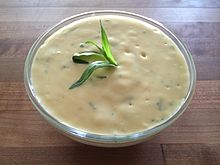Béarnaise sauce
 | |
| Type | Sauce |
|---|---|
| Place of origin | France |
| Main ingredients | Egg yolk, clarified butter, white wine vinegar |
Béarnaise sauce (/bərˈneɪz/; French: [be.aʁ.nɛz]) is a sauce made of butter, egg yolk, white-wine vinegar, and herbs. It is regarded as a "child" of hollandaise sauce.[1] The difference is only in the flavoring: béarnaise uses shallot, black pepper, and tarragon, while hollandaise uses white pepper or a pinch of cayenne.
The sauce's name derives from the province of Béarn, France. It is a traditional sauce for steak.[2][3]
History
Legend has it that the sauce was accidentally[dubious – discuss] invented by the chef Jean-Louis-François Collinet, the accidental inventor of puffed potatoes (pommes de terre soufflées),[4] and served at the 1836 opening of Le Pavillon Henri IV, a restaurant at Saint-Germain-en-Laye. The restaurant was in the former residence of Henry IV of France, a gourmet himself, who was from Béarn.[4][5]
Although the sauce is a French invention, it caught on in the Nordic countries in the late 20th century, where it forms a major part of local steak cuisine with steaks and fries,[6] and is occasionally used there as topping on pizza, whether as part of the pizza or as a cold dressing put on afterwards.
Preparation
A Béarnaise sauce is simply clarified butter, an egg yolk, a shallot, a little tarragon vinegar. It takes years of practice for the result to be perfect. – Fernand Point [7]
As with hollandaise, there are several methods for preparing béarnaise.
The most common method of preparation uses a bain-marie, whisking to a temperature of 66 °C (150 °F),[8] where a reduction of vinegar is used to acidify the yolks.
Auguste Escoffier[2] calls for a reduction of wine, vinegar, shallots, fresh chervil, fresh tarragon, and crushed peppercorns (later strained out), with fresh tarragon and chervil to finish instead of lemon juice. Others are similar.[9]
Alternatively, the flavorings may be added to a finished hollandaise (without lemon juice). Joy of Cooking[10] describes a blender preparation with the same ingredients.
Derivatives
- Sauce Choron (also called béarnaise tomatée) uses tomato purée instead of herbs.[10][11] It is named after Alexandre Étienne Choron.
- Sauce Foyot (also called Valois) is béarnaise with meat glaze (glace de viande) added.[10][12]
- Sauce Paloise uses mint instead of tarragon.[13]
See also
References
- ^ The family is sometimes referred to as "mayonnaise sauces" as they are, like mayonnaise, based on the emulsion of an oil in egg water.
- ^ a b Escoffier: 89
- ^ Julia Child
- ^ a b "La sauce béarnaise". 16 May 2015.
- ^ "What is Bearnaise sauce? | Cookthink". Archived from the original on 2009-06-02. Retrieved 2010-03-08.
- ^ "Ad libitum: Populære bøfrestauranter inviterer på steak fries og bearnaise" (in Danish). MigogKbh. 21 April 2023. Retrieved 21 June 2023.
- ^ Restaurateur Fernand Point (1897–1955) in Ma Gastronomie.
- ^ "How to Make Hollandaise | A French Mother Sauce | Stella Culinary".
- ^ Cookwise, pp.304-5
- ^ a b c Joy of Cooking p.359
- ^ Escoffier: 90
- ^ Escoffier: 91
- ^ Escoffier: 141
- Sources
- Child, Julia; Louisette Bertholle; Simone Beck (1961). Mastering the Art of French Cooking. New York: Knopf.
- Corriher, Shirley (1997). "Ch. 4: sauce sense". Cookwise, the Hows and Whys of Successful Cooking (1st ed.). New York: William Morrow & Company, Inc. ISBN 0688102298.
- David, Elizabeth (1960). French Provincial Cooking. Penguin. ISBN 978-0-14-118153-0.
- Escoffier, Auguste (1982) [Trans. fm 4th French (Flammarion) ed. 1921]. "Ch. 1: Sauces". La Guide Culinaire [The Complete Guide to the Art of Modern Cookery] (in French). English translation by H.L. Cracknell and R.J. Kaufmann (First American ed.). New York: Mayflower Books. ISBN 0-8317-5478-8.
- Rombauer, Irma S.; Rombauer Becker, Marion (1975). Joy of Cooking. New York: The Bobbs-Merrill Company, Inc. (MacMillan). ISBN 0-02-604570-2.
External links
- Béarnaise sauce from the British Good Food TV channel
